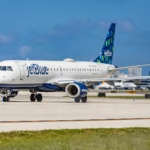Boeing is expected to temporarily cease production of the troubled 737-MAX sometime this week, perhaps as soon as today.
The executives of Boeing have been in a Board meeting in Chicago since yesterday and an announcement is expected later today, Monday.
Today’s pre-opening trading in New York has Boeing’s shares down 2.8% and have lost 19% since the fatal accident in Ethiopia in March this year.
Production of the MAX has been at 42 per month, with inventory losses now assuming huge proportions. It’s estimated that there maybe in excess of 380 undeliverable aircraft in storage.
Last Thursday, 12th December, Boeing was advised by the American Federal Aviation Authority (FAA) that permission for the MAX to fly would not occur until next year. A major operator of the aircraft, American Airlines are not scheduling their aircraft for a return to service before early April 2020.
On Sunday, Boeing said that they “will continue to assess production decisions based on the timing and conditions of return to service, which will be based on regulatory approvals and may vary by jurisdiction.” We can assume other regulators such as the European EASA and TCCA in Canada will not simply rubber-stamp approval based on the FAA outcome.

The relationship between Boeing and the FAA has been strained recently with the regulator warning that they would not be working to a timetable for approval but rather ensuring that the process and outcomes at each step are satisfactory. During the announcement last week FAA Administrator Steve Dickson criticised the CEO of Boeing, Dennis Muilenburg of pursuing an unrealistic schedule.

Dennis Muilenburg CEO Boeing. © Sha Hanting-CNS via Getty Images
The anticipated shutdown is not a simple matter of hitting a few switches; the production line will take a few weeks to stop running. Each MAX has approximately 400 000 parts and has a global supply chain, including some 600 suppliers in the US alone. There are real concerns that given the likely break in production, many highly skilled workers in these suppliers will look for other work, preventing a quick re-start of the production line in Seattle.









